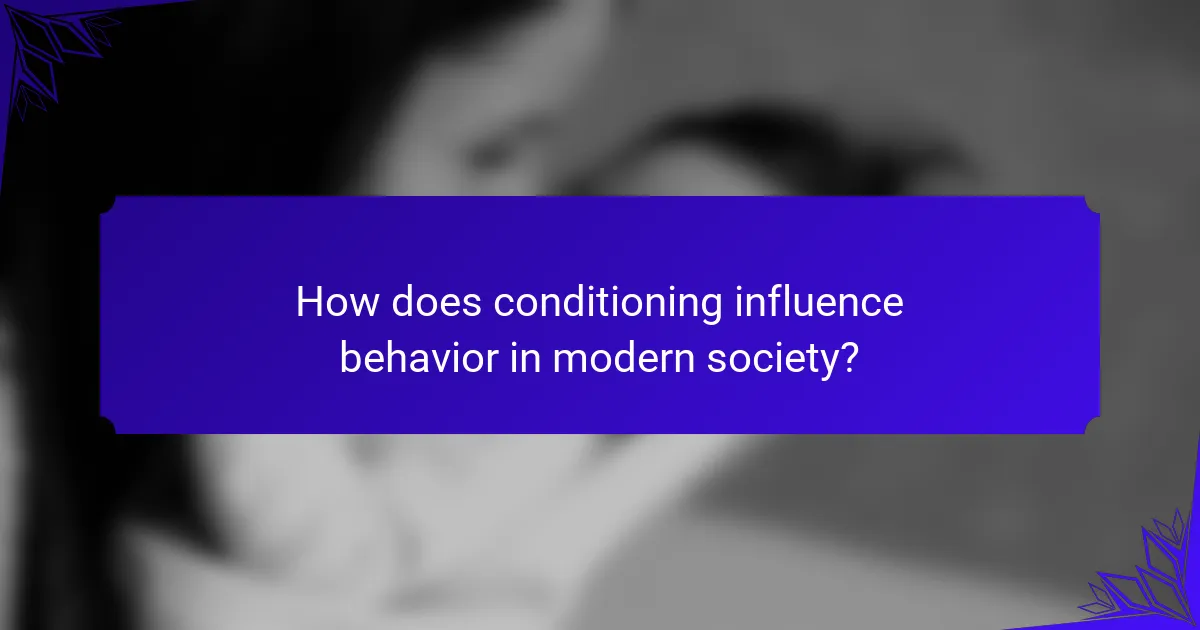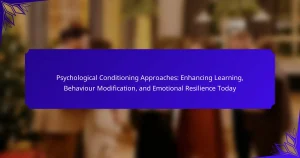Conditioning enhances learning, adaptability, and emotional resilience in modern society. It shapes responses to stimuli, improving memory retention and coping strategies. Positive reinforcement in education fosters engagement, while workplace feedback mechanisms aid adaptability. Understanding the contextual factors and individual variability of conditioning can deepen insights into effective strategies for navigating contemporary challenges.

How does conditioning influence behavior in modern society?
Conditioning significantly influences behavior in modern society by enhancing learning, adaptability, and emotional resilience. Through processes such as classical and operant conditioning, individuals develop responses to various stimuli, shaping their interactions and decision-making.
For example, positive reinforcement in educational settings fosters a growth mindset, encouraging students to embrace challenges. Similarly, conditioning plays a role in workplace environments, where feedback mechanisms help employees adapt to changing demands.
Moreover, emotional resilience is cultivated through conditioned responses to stressors. Individuals learn coping strategies based on past experiences, enabling them to navigate life’s challenges effectively.
Overall, conditioning serves as a foundational element in behavioral development, impacting personal and social dynamics in contemporary life.
What are the foundational principles of conditioning?
The foundational principles of conditioning include reinforcement, punishment, and the association between stimuli and responses. Reinforcement increases the likelihood of a behavior, while punishment decreases it. Classical conditioning establishes associations between stimuli, enhancing learning and adaptability. These principles foster emotional resilience in modern society by shaping behaviors that promote well-being and effective coping strategies.
What role does classical conditioning play in learning?
Classical conditioning significantly enhances learning by creating associations between stimuli and responses. This process fosters adaptability and emotional resilience, essential traits in modern society. Through repeated exposure, individuals develop conditioned responses that facilitate quicker learning and behavioral adjustments. For example, students can improve focus by associating study environments with positive outcomes. This unique attribute of classical conditioning underscores its vital role in shaping behavior and enhancing learning experiences.
How does classical conditioning shape emotional responses?
Classical conditioning significantly shapes emotional responses by creating associations between stimuli and feelings. This process enhances learning and adaptability, allowing individuals to respond to environmental cues effectively. For example, a person may develop a fear of dogs after being bitten, associating the animal with pain. This conditioned response fosters emotional resilience, as individuals learn to navigate their experiences. Understanding this mechanism can improve therapeutic approaches, promoting healthier emotional responses in various contexts.
What are the effects of operant conditioning on behavior?
Operant conditioning significantly influences behavior by enhancing learning, adaptability, and emotional resilience. It shapes responses through reinforcement and punishment, promoting desired actions while discouraging undesirable ones. This conditioning fosters adaptability in various environments, enabling individuals to navigate challenges effectively. Additionally, it plays a crucial role in emotional resilience, helping individuals develop coping strategies in stressful situations. Overall, operant conditioning is vital for personal growth and effective behavior modification in modern society.
What are the different reinforcement schedules?
Reinforcement schedules are methods used to determine how and when reinforcement is delivered. The primary types include fixed-ratio, variable-ratio, fixed-interval, and variable-interval schedules. Each schedule impacts behavior differently, influencing learning and adaptability.
Fixed-ratio schedules provide reinforcement after a specific number of responses. For example, a reward is given after every fifth response. Variable-ratio schedules offer reinforcement after an unpredictable number of responses, enhancing persistence in behavior.
Fixed-interval schedules provide reinforcement after a set time period, such as receiving a paycheck every two weeks. Variable-interval schedules deliver reinforcement at random time intervals, which can lead to steady response rates.
Understanding these schedules enhances emotional resilience by promoting adaptable behaviors in various contexts, such as education and workplace settings.
How does conditioning enhance adaptability in everyday life?
Conditioning enhances adaptability by reinforcing learned behaviors that respond effectively to changing environments. This process fosters emotional resilience, enabling individuals to manage stress and uncertainty better. For instance, classical conditioning can create positive associations with new experiences, making transitions smoother. As a result, individuals become more adept at navigating daily challenges and uncertainties, ultimately improving their overall quality of life.

What are the universal benefits of conditioning?
Conditioning offers universal benefits that enhance learning, adaptability, and emotional resilience. It fosters improved behavioral responses, enabling individuals to navigate challenges effectively.
One significant benefit is the enhancement of learning processes. Through conditioning, individuals develop better memory retention and information processing skills. This allows for quicker adaptation to new environments and situations.
Additionally, conditioning strengthens emotional resilience. It equips individuals with coping mechanisms to manage stress and anxiety, leading to healthier emotional responses. This resilience is particularly crucial in modern society, where challenges are frequent.
Lastly, conditioning promotes adaptability. By reinforcing positive behaviors and responses, individuals can adjust to changing circumstances, making them more versatile in various aspects of life.
How does conditioning improve learning outcomes?
Conditioning significantly enhances learning outcomes by reinforcing desired behaviors through consistent reinforcement. This process fosters adaptability and emotional resilience, crucial in modern society. For example, positive reinforcement encourages students to engage more actively in their learning environment. Research indicates that conditioned responses can lead to improved retention and application of knowledge, as learners associate specific stimuli with successful outcomes. Overall, conditioning shapes behavior, making individuals more adept at navigating challenges and acquiring new skills efficiently.
What impact does conditioning have on emotional resilience?
Conditioning significantly enhances emotional resilience by promoting adaptive coping strategies. Through repeated exposure to stressors in a controlled manner, individuals learn to manage their emotional responses effectively. This process fosters a sense of control, reducing anxiety and improving overall mental health. Research indicates that conditioned responses can lead to quicker recovery from emotional distress, reinforcing resilience over time.

What unique aspects of conditioning are relevant today?
Conditioning significantly influences behavior today by enhancing learning, adaptability, and emotional resilience. One unique aspect is its application in educational settings, where techniques like positive reinforcement improve student engagement and retention. Another relevant aspect is the role of conditioning in mental health, where behavioral therapies utilize conditioning principles to build coping strategies. Additionally, conditioning shapes consumer behavior, impacting how brands create loyalty through targeted marketing strategies. These aspects highlight the importance of conditioning in navigating modern societal challenges.
How do modern technologies leverage conditioning principles?
Modern technologies leverage conditioning principles by utilizing reinforcement techniques to enhance learning and adaptability. For instance, educational apps employ gamification to reward users, promoting engagement and emotional resilience. These technologies often utilize algorithms that adapt content based on user behavior, reinforcing positive learning experiences. As a result, individuals develop skills and adapt to challenges more effectively, demonstrating the practical application of conditioning in contemporary society.
What unique challenges arise in conditioning practices?
Unique challenges in conditioning practices include individual variability, environmental influences, and the potential for maladaptive behaviors. Individual differences in learning styles and emotional responses can affect conditioning outcomes. Environmental factors, such as stressors or social dynamics, may disrupt the conditioning process. Additionally, over-reliance on conditioning can lead to maladaptive behaviors, undermining emotional resilience and adaptability. These challenges necessitate a tailored approach to conditioning that considers unique attributes of each individual.

What rare attributes of conditioning should we consider?
Rare attributes of conditioning include the influence of contextual factors, individual variability, and the role of neuroplasticity. Contextual factors affect how conditioning is perceived and applied in different environments, shaping behavior uniquely. Individual variability highlights that each person’s response to conditioning can differ based on genetics and experiences. Neuroplasticity, as a rare attribute, emphasizes the brain’s ability to reorganize itself through learning and conditioning, allowing for enhanced adaptability and emotional resilience. Understanding these rare attributes can deepen insights into effective conditioning strategies in modern society.
How does cultural context affect conditioning processes?
Cultural context significantly influences conditioning processes by shaping behaviors, expectations, and emotional responses. Variations in cultural norms and values affect how individuals learn and adapt. For example, collectivist cultures may emphasize group harmony, impacting reinforcement strategies. As a result, emotional resilience can vary based on cultural conditioning, highlighting the unique attributes of diverse societies. Understanding these influences enhances the effectiveness of behavioral interventions in modern society.
What are the long-term effects of conditioning on behavior?
Conditioning has profound long-term effects on behavior, enhancing learning, adaptability, and emotional resilience. Over time, individuals develop conditioned responses that shape their reactions to various stimuli, facilitating quicker learning and adaptation to new environments.
One significant effect is the enhancement of emotional resilience. Through repeated exposure to specific situations, individuals learn to manage stress and anxiety better, leading to improved coping strategies. For example, consistent positive reinforcement can foster a growth mindset, enabling individuals to approach challenges with confidence.
Additionally, conditioning can influence social behaviors. People often adjust their interactions based on past experiences, leading to more effective communication and relationship-building skills. This adaptability is crucial in modern society, where social dynamics are constantly evolving.
Lastly, the long-term impact of conditioning extends to decision-making processes. Individuals conditioned to evaluate outcomes based on previous experiences tend to make more informed choices, enhancing their overall life satisfaction and success.

What practical strategies can enhance conditioning effectiveness?
To enhance conditioning effectiveness, focus on practical strategies that promote active engagement and consistent practice. Incorporate varied learning environments, utilize positive reinforcement, and set clear, achievable goals.
1. Diversify training scenarios to improve adaptability.
2. Implement regular feedback loops to track progress.
3. Use gamification techniques to increase motivation.
4. Establish a routine to reinforce habits.
5. Encourage reflection to deepen understanding.
How can individuals apply conditioning techniques for personal growth?
Individuals can apply conditioning techniques for personal growth by consistently reinforcing positive behaviors and adapting their responses to challenges. Techniques such as positive reinforcement, where rewarding oneself for achieving goals enhances motivation, can significantly improve learning and adaptability. Emotional resilience can be fostered through practices like mindfulness and cognitive restructuring, which help individuals reframe negative thoughts. These methods empower individuals to respond effectively to stressors, promoting overall well-being. Engaging in regular self-reflection further solidifies these practices, ensuring continuous personal development.
What common mistakes should be avoided in conditioning practices?
Common mistakes in conditioning practices include inconsistency in reinforcement, neglecting individual differences, and failing to measure progress. Inconsistent reinforcement can confuse learners, leading to ineffective behavior change. Ignoring individual differences may result in strategies that do not resonate with all participants, diminishing effectiveness. Additionally, not measuring progress can prevent adjustments necessary for successful outcomes. These mistakes can hinder the overall impact of conditioning on behavior, adaptability, and emotional resilience.
What expert insights can optimize conditioning approaches?
Expert insights can greatly enhance conditioning approaches by focusing on tailored strategies that improve learning and adaptability. Emphasizing emotional resilience is crucial in modern society. Research indicates that incorporating varied conditioning techniques, such as positive reinforcement and cognitive-behavioral methods, leads to better outcomes. Unique attributes like personalized feedback and adaptive challenges can optimize the conditioning process. As a result, individuals become more adept at navigating complex environments, ultimately fostering greater emotional stability and flexibility.


